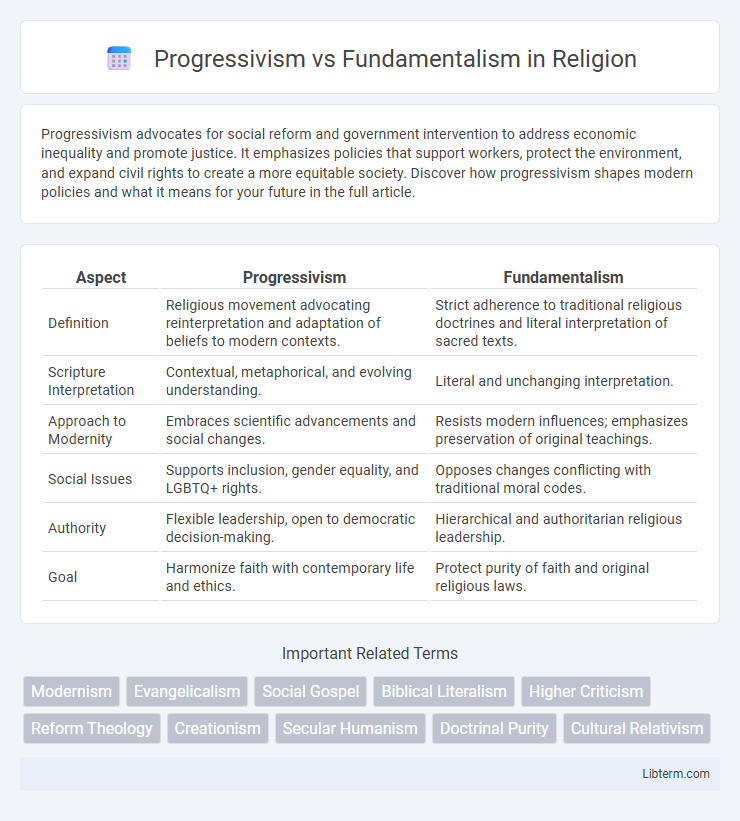Progressivism advocates for social reform and government intervention to address economic inequality and promote justice. It emphasizes policies that support workers, protect the environment, and expand civil rights to create a more equitable society. Discover how progressivism shapes modern policies and what it means for your future in the full article.
Table of Comparison
| Aspect | Progressivism | Fundamentalism |
|---|---|---|
| Definition | Religious movement advocating reinterpretation and adaptation of beliefs to modern contexts. | Strict adherence to traditional religious doctrines and literal interpretation of sacred texts. |
| Scripture Interpretation | Contextual, metaphorical, and evolving understanding. | Literal and unchanging interpretation. |
| Approach to Modernity | Embraces scientific advancements and social changes. | Resists modern influences; emphasizes preservation of original teachings. |
| Social Issues | Supports inclusion, gender equality, and LGBTQ+ rights. | Opposes changes conflicting with traditional moral codes. |
| Authority | Flexible leadership, open to democratic decision-making. | Hierarchical and authoritarian religious leadership. |
| Goal | Harmonize faith with contemporary life and ethics. | Protect purity of faith and original religious laws. |
Understanding Progressivism: Core Principles
Progressivism centers on advocating for social reform, economic equity, and the expansion of civil rights through government intervention and policy innovation. It emphasizes the importance of adapting to modern societal changes, promoting scientific progress, and supporting education to address systemic inequalities. Key principles include social justice, environmental stewardship, and a belief in the potential for human advancement through collective action.
Defining Fundamentalism: Key Beliefs
Fundamentalism is characterized by a strict adherence to specific theological doctrines, often emphasizing the literal interpretation of sacred texts. Core beliefs include the inerrancy of scripture, the necessity of personal moral purity, and opposition to modernist interpretations that deviate from traditional religious teachings. This ideology frequently promotes a clear distinction between good and evil, rejecting secularism and advocating for the restoration of original religious values.
Historical Origins of Progressivism and Fundamentalism
Progressivism emerged in the late 19th and early 20th centuries as a response to the social and economic challenges of industrialization, emphasizing reforms such as labor rights, women's suffrage, and government regulation. Fundamentalism originated in the early 20th century as a reaction against modernist theology and secularism, rooted in a literal interpretation of Christian scriptures and opposition to scientific theories like evolution. Both movements reflect distinct responses to rapid cultural and intellectual changes during the Progressive Era in the United States.
Major Philosophical Differences
Progressivism advocates for adapting religious interpretations to contemporary societal values, emphasizing social justice, inclusivity, and scientific understanding. Fundamentalism insists on a literal interpretation of sacred texts, promoting adherence to traditional doctrines and moral absolutes. These contrasting approaches highlight a philosophical divide between dynamic, context-driven theology and fixed, text-centric belief systems.
Social and Cultural Impacts
Progressivism fostered social reforms advocating for civil rights, gender equality, and educational advancements, profoundly reshaping cultural norms toward inclusivity and modernization. Fundamentalism resisted these changes, emphasizing strict adherence to traditional religious values and promoting social conservatism to preserve established moral frameworks. The clash between these ideologies catalyzed significant societal debates on identity, morality, and the role of religion in public life.
Educational Approaches: Progressive vs. Fundamentalist Views
Progressivism in education emphasizes student-centered learning, critical thinking, and experiential activities that foster creativity and problem-solving skills, promoting adaptability in a rapidly changing world. Fundamentalist educational approaches prioritize traditional curricula, rote memorization, and strict adherence to established knowledge and moral values, aiming to preserve cultural and intellectual foundations. These contrasting methods reflect broader philosophical differences, where progressivism encourages innovation and exploration while fundamentalism upholds stability and continuity in education.
Political Implications and Policy Stances
Progressivism advocates for social reform, government intervention, and policies promoting equality, environmental protection, and civil rights, shaping progressive political platforms toward expanding healthcare access and climate action. Fundamentalism emphasizes adherence to traditional values, often resulting in conservative policy stances on issues like education, family structures, and resistance to secular influences in government. Political implications include the polarization of legislative agendas, with progressivism pushing for inclusive social policies and fundamentalism resisting changes that conflict with religious or cultural doctrines.
Religion and Morality in Progressivism and Fundamentalism
Progressivism in religion emphasizes adapting moral principles to contemporary social contexts, promoting inclusivity, social justice, and ethical pluralism. Fundamentalism upholds strict adherence to literal interpretations of sacred texts, enforcing traditional moral codes considered timeless and absolute. These contrasting approaches shape religious engagement, influencing debates on modern ethical issues such as gender roles, sexuality, and human rights.
Modern Challenges and Contemporary Debates
Progressivism and fundamentalism face modern challenges such as navigating cultural pluralism, scientific advancements, and evolving moral frameworks. Contemporary debates often center on reconciling progressive interpretations of social justice and human rights with fundamentalist commitments to traditional doctrines and literal scriptural authority. These tensions manifest in political discourse, educational policies, and legal battles over issues like gender identity, religious freedom, and secularism.
Bridging the Divide: Paths Toward Reconciliation
Bridging the divide between Progressivism and Fundamentalism requires fostering dialogue grounded in mutual respect and shared values such as community and ethical behavior. Emphasizing common goals like social justice, education, and spiritual growth enables collaborative pathways that transcend ideological rigidity. Practical initiatives combining progressive inclusivity with fundamentalist tradition create opportunities for reconciliation and sustainable coexistence.
Progressivism Infographic

 libterm.com
libterm.com